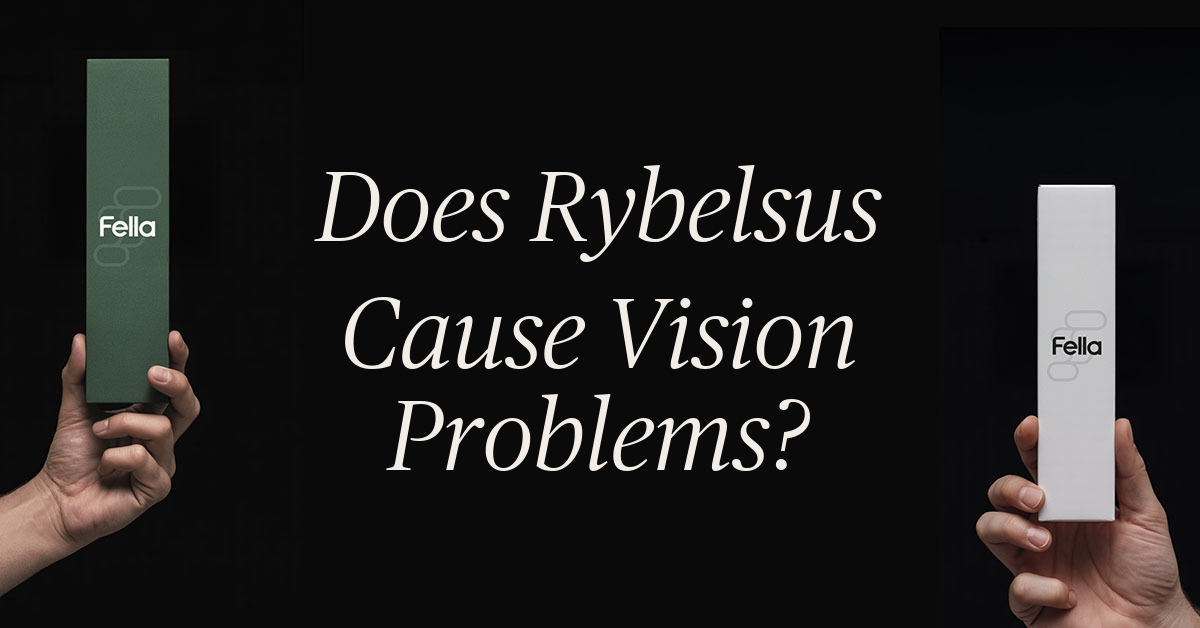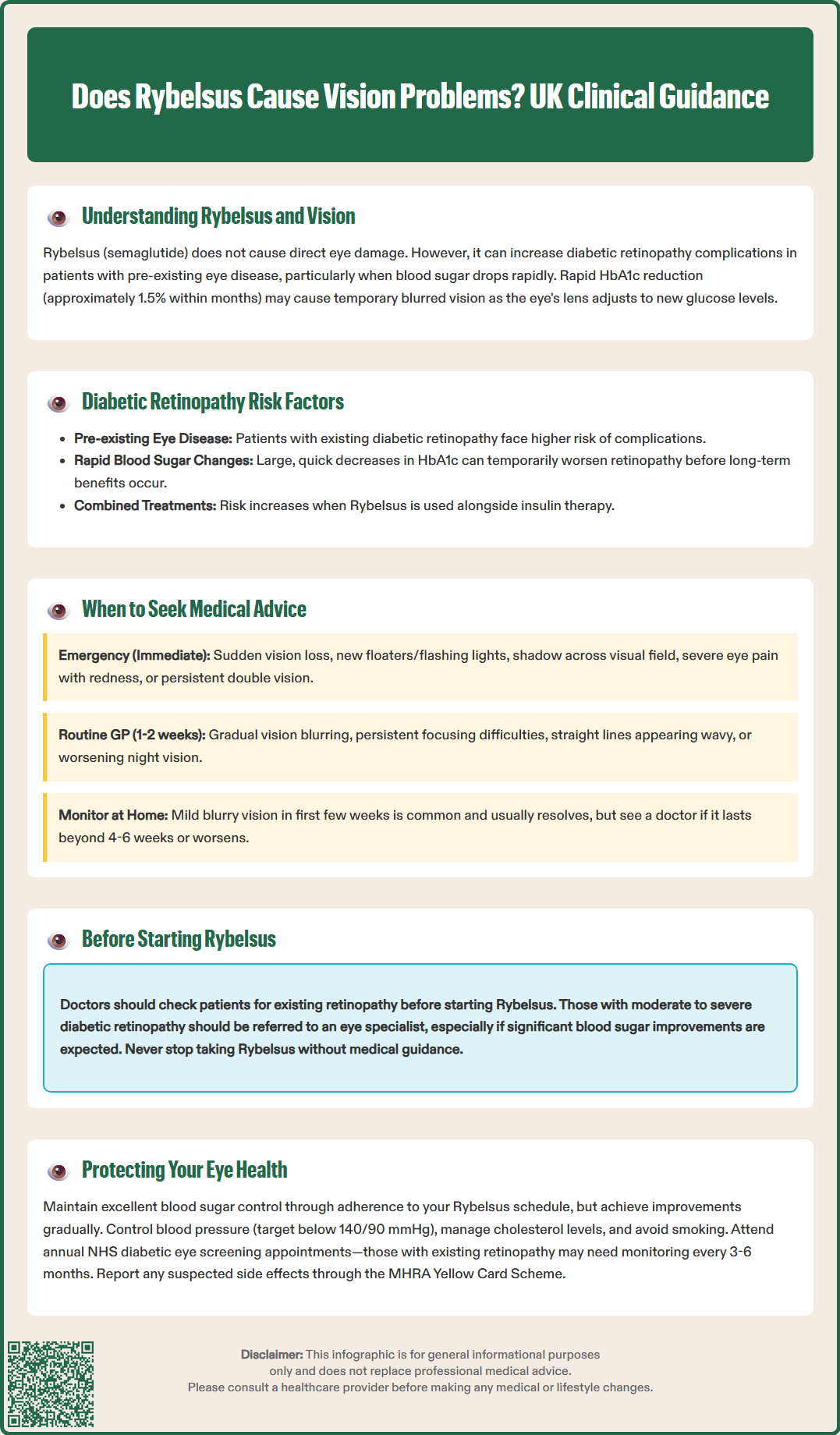
Rybelsus (semaglutide) is an oral GLP-1 receptor agonist licensed in the UK for type 2 diabetes mellitus. Whilst vision problems are not amongst the most commonly reported adverse effects, changes in vision have been documented in clinical trials and post-marketing surveillance. The relationship between Rybelsus and vision changes is complex: direct ocular toxicity is not established, but semaglutide has been associated with increased diabetic retinopathy complications in patients with pre-existing disease experiencing rapid HbA1c reduction. Most vision changes related to improved glucose control are temporary, but any new or worsening visual symptoms warrant prompt medical assessment.
Quick Answer: Rybelsus (semaglutide) is not directly toxic to the eyes, but it has been associated with increased diabetic retinopathy complications in patients with pre-existing retinopathy who experience rapid HbA1c reduction.

Mounjaro® is the most innovative GLP-1 medication proven to dramatically curb appetite, hunger, and cravings to help professional men achieve substantial weight loss.
Start Here
Wegovy® is a weekly injectable GLP-1 medication with proven effectiveness in reducing appetite, hunger, and cravings to help busy professionals lose significant weight.
Start HereRybelsus (semaglutide) is an oral glucagon-like peptide-1 (GLP-1) receptor agonist licensed in the UK for the treatment of type 2 diabetes mellitus. Whilst vision problems are not amongst the most commonly reported adverse effects of Rybelsus, changes in vision have been documented in clinical trials and post-marketing surveillance data.
The relationship between Rybelsus and vision changes is complex. Direct ocular toxicity from semaglutide is not established, but semaglutide has been associated with increased diabetic retinopathy complications in those with pre-existing disease and rapid HbA1c reduction. When blood glucose levels decrease quickly—particularly in patients with pre-existing diabetic retinopathy—temporary changes in the lens of the eye can cause blurred vision. This phenomenon is well-recognised across diabetes treatments and typically resolves within weeks as the eye adjusts to the new glucose environment.
The SUSTAIN-6 cardiovascular outcomes trial identified a small increase in diabetic retinopathy complications in certain patient populations, particularly those with existing retinopathy and rapid HbA1c reduction (a fall of approximately 1.5% or 16 mmol/mol within months). The MHRA product information for Rybelsus advises healthcare professionals to monitor patients with a history of diabetic retinopathy, especially during the initial treatment period, and notes additional caution may be needed when used with insulin.
Patients should be aware that most vision changes associated with improved diabetes control are temporary. However, any new or worsening visual symptoms warrant prompt medical assessment. Patients should not stop or alter their Rybelsus dosing without medical advice if they notice vision changes.

Diabetic retinopathy is a microvascular complication of diabetes and one of the leading causes of preventable blindness in working-age adults in the UK. The condition develops when chronically elevated blood glucose damages the small blood vessels in the retina, leading to haemorrhages, exudates, and in advanced cases, proliferative changes with new vessel formation.
The SUSTAIN-6 cardiovascular outcomes trial, which evaluated injectable semaglutide (the same active ingredient as Rybelsus), identified a statistically significant increase in diabetic retinopathy complications compared with placebo. This finding prompted considerable discussion within the diabetes community. Subsequent analyses suggested the increased risk was primarily observed in patients with pre-existing retinopathy who experienced rapid HbA1c reductions. The mechanism is thought to relate to rapid metabolic changes causing temporary worsening of retinal ischaemia before long-term benefits accrue.
It is important to contextualise these findings: improved long-term glycaemic control reduces diabetic retinopathy progression. The challenge lies in the pace of glucose reduction rather than the medication itself. Rapid, large HbA1c reductions can transiently worsen retinopathy (early worsening phenomenon), and patients with existing retinopathy need close monitoring.
For Rybelsus specifically, real-world data continue to accumulate. Current evidence regarding oral semaglutide's retinopathy risk profile is limited; healthcare professionals should follow the same precautions as with injectable formulations, in line with the SmPC. Healthcare professionals should assess retinopathy status before initiating GLP-1 receptor agonists and consider ophthalmology referral for patients with moderate to severe non-proliferative or proliferative diabetic retinopathy, particularly if rapid glucose improvements are anticipated.
Patients taking Rybelsus should be educated about vision symptoms that require urgent or routine medical assessment. Immediate medical attention (same-day GP appointment, eye casualty department, A&E, or NHS 111 for urgent advice) is warranted for:
Sudden vision loss in one or both eyes
Floaters or flashing lights, particularly if new or increasing in number
A curtain or shadow moving across the visual field
Severe eye pain accompanied by redness or vision changes
Double vision that persists or worsens
These symptoms may indicate serious conditions such as retinal detachment, vitreous haemorrhage, or acute angle-closure glaucoma, which require emergency ophthalmological assessment regardless of diabetes medication.
Routine GP consultation (within one to two weeks) is appropriate for:
Gradual blurring of vision that does not improve with blinking
Difficulty focusing or reading that persists beyond a few weeks
Distortion of straight lines (when straight lines appear wavy or bent, known as metamorphopsia)
Increased difficulty with night vision
Patients should be advised that mild, transient blurring during the first few weeks of Rybelsus treatment may be related to changing glucose levels and often resolves spontaneously. However, if symptoms persist beyond four to six weeks, worsen, or cause functional impairment, medical review is essential. In some areas, community optometrists can provide urgent assessment through local eye care pathways.
It is also important to maintain regular diabetic eye screening appointments through the NHS Diabetic Eye Screening Programme, which offers annual retinal photography for all people with diabetes aged 12 and over. These appointments should continue as scheduled and are not replaced by symptom-based consultations. Patients who develop new visual symptoms between screening appointments should not wait for their next scheduled screening but should seek earlier assessment.
Patients should not drive if experiencing sudden or significant vision changes.
Optimising eye health whilst taking Rybelsus requires a multifaceted approach that addresses both diabetes management and ocular monitoring. The cornerstone of diabetic eye disease prevention remains excellent glycaemic control, but the pace and manner of achieving this control matters, particularly in vulnerable patients.
Before initiating Rybelsus, healthcare professionals should:
Review diabetic retinopathy status from recent screening results
Consider ophthalmology referral for patients with moderate or worse retinopathy not already under specialist care
Discuss realistic HbA1c targets that balance cardiovascular benefit against retinopathy risk
Plan gradual dose escalation according to the licensed titration schedule (starting at 3 mg daily for one month, then 7 mg, with optional increase to 14 mg) as per the Rybelsus SmPC
During treatment, patients can support their eye health through:
Monitoring blood glucose if recommended by their diabetes team (e.g., if on insulin/agents causing hypoglycaemia or if symptomatic)
Adhering to the prescribed Rybelsus dose schedule without skipping or doubling doses
Controlling blood pressure (target generally <140/90 mmHg in clinic, with lower targets considered for those with significant albuminuria, in line with NICE NG136 and CKD guidance)
Managing lipids according to cardiovascular risk assessment (NICE NG238)
Avoiding smoking, which significantly accelerates diabetic retinopathy progression
Regular monitoring is essential. Patients should attend annual diabetic eye screening appointments and report any interval vision changes promptly. For those with known retinopathy, more frequent ophthalmology review may be indicated—typically every 3–6 months depending on severity.
Healthcare teams should maintain clear communication between primary care, diabetes specialist services, and ophthalmology. Shared care protocols can facilitate appropriate monitoring intensity and ensure timely intervention if retinopathy progression occurs. Patients should be empowered with written information about warning symptoms and clear pathways for accessing urgent eye care when needed.
If you suspect Rybelsus has caused vision problems or other side effects, report this through the MHRA Yellow Card Scheme (yellowcard.mhra.gov.uk).
Direct ocular toxicity from Rybelsus (semaglutide) is not established. However, it has been associated with worsening diabetic retinopathy complications in patients with pre-existing retinal disease who experience rapid HbA1c reduction, rather than causing direct eye damage.
Seek immediate medical attention for sudden vision loss, new floaters or flashing lights, a curtain or shadow across your visual field, severe eye pain with redness, or persistent double vision. These symptoms may indicate serious conditions requiring emergency ophthalmological assessment.
Do not stop or alter your Rybelsus dosing without medical advice. Mild, transient blurring during the first few weeks may relate to changing glucose levels and often resolves spontaneously, but any persistent, worsening, or concerning vision changes should be assessed by your GP or diabetes team.
All medical content on this blog is created based on reputable, evidence-based sources and reviewed regularly for accuracy and relevance. While we strive to keep content up to date with the latest research and clinical guidelines, it is intended for general informational purposes only.
DisclaimerThis content is not a substitute for professional medical advice, diagnosis, or treatment. Always consult a qualified healthcare professional with any medical questions or concerns. Use of the information is at your own risk, and we are not responsible for any consequences resulting from its use.